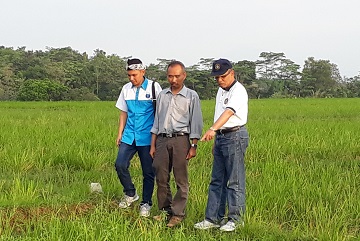The Harvest of IPB 3S Seed for National Distribution

Inasmuch as food security means making food available and affordable to citizens of a country, tackling the food security issue necessarily involves more than one strategy. An obvious strategy is increasing food production and improving yields. Another strategy is improving access to food, which means providing markets, investing in infrastructure and providing employment opportunities. Food security is really a flexible concept as reflected in the many attempts at definition in research and policy usage. Thus, food security does not always look at the dimensions of food price stability, but also must keep in mind the efficiency of farming. Agricultural efficiency begins with seed self-sufficiency, fertilizer availability and agricultural consolidation. Expenses spent by farmers to avail the seeds require should always be considered so that farmers get adequate profits from agricultural activities. Always committed to assist farmers and with the support from the Ministry of Research, Technology and Higher Education (Kemenristekdikti) RI to develop innovation in agriculture, Bogor Agricultural University (IPB) harvested the excellence of IPB 3S seeds in Cariu Bogor, on 11 July 2017.
The harvest of IPB 3S rice in Jonggol, Bogor, this time was carried out jointly by the Rector of IPB, Prof. Dr. Herry Suhardiyanto, with Bogor Regent as well as the executive boards of Agriculture Services of West Java, the Directorate General of Food Crops of the Ministry of Agriculture, and also accompanied by the Executive Boards of Faculty of Agriculture, and representative of Institute for Research and Community Service (LPPM) of IPB, and IPB Research Team. The team was represented by Dr. Eny Widayati, Dr. Abdul Qadir, Ir. Murdiyanto, MS and Ahmad Zamzami SP, MS.
On this occasion symbolically IPB Rector handed over the rice seeds to Bogor Regent for the national distribution. Meanwhile, the Bogor Regent also handed over ALSINTAN (tools and agricultural machineries) it was the combine harvester for Cariu farmers.
IPB Rector stressed the importance of consolidating agriculture and encouraging all components of society to continue to consistently manage agricultural land, increase rice production and control the conversion of productive lands into other purposes. "This is one of our efforts to suppress rice imports that continue to occur in this country without regard to small farmers and tillers. IPB is committed to continuing find out the best solution for farmers to get better results, "said Rector.
IPB 3S rice had been invented by IPB's innovator Dr. Ir. Hajrial Aswidinnoor, MSc and his team. The rice IPB 3S variety has number advantages, the number of grains per panicle 300-400 grains with the yield average of 7 tonnes / ha and yield potential could reach 11.2 tonnes / ha. The upright leaf position enable the variety captures more light for better photosensitivity. IPB 3S leaves its upward bush over the panicle of rice, thus protecting the grain from the pest of birds. Therefore, IPB 3S rice has the advantage because it has better endurance than other plant species.
Bogor Regent on this special occasion expressed her gratitude to IPB for mutual cooperation in various activities, especially in agriculture field. The invention of IPB 3S in Bogor Regency has been started since last year by planting 50 hectares of rice field in Tanjung Sari Subdistrict. At that time Kemenristekdikikdikti symbolically started the planting process as an effort to increase the START-UP seeds. Furthermore, it is proclaimed as the self-supporting seeds program by planting IPB 3S rice variety in the 8 hectares of fields, consisting of 3 hectares for seeds and 5 hectares of rice consumption. This seed independent program is extended to three districts, namely Bogor West Java, Pinrang-South Sulawesi and Banyuasin in South Sumatra.
IPB 3S rice innovation becomes an excellence of Indonesia to boost national rice production. It is well-understood that the existing variety is stagnant and reaching leveling off condition, 3B IPB planting in various parts of Indonesia is expected to boost the national rice surplus. We expect the planting of new rice variety will enable Indonesia to achieve rice self-sufficiency by 2020, and no longer depend on imports. Accordingly, stopping rice importation will help improve the welfare of farmers and stop imported cartels continue to hurt small farmers. (Wied)



